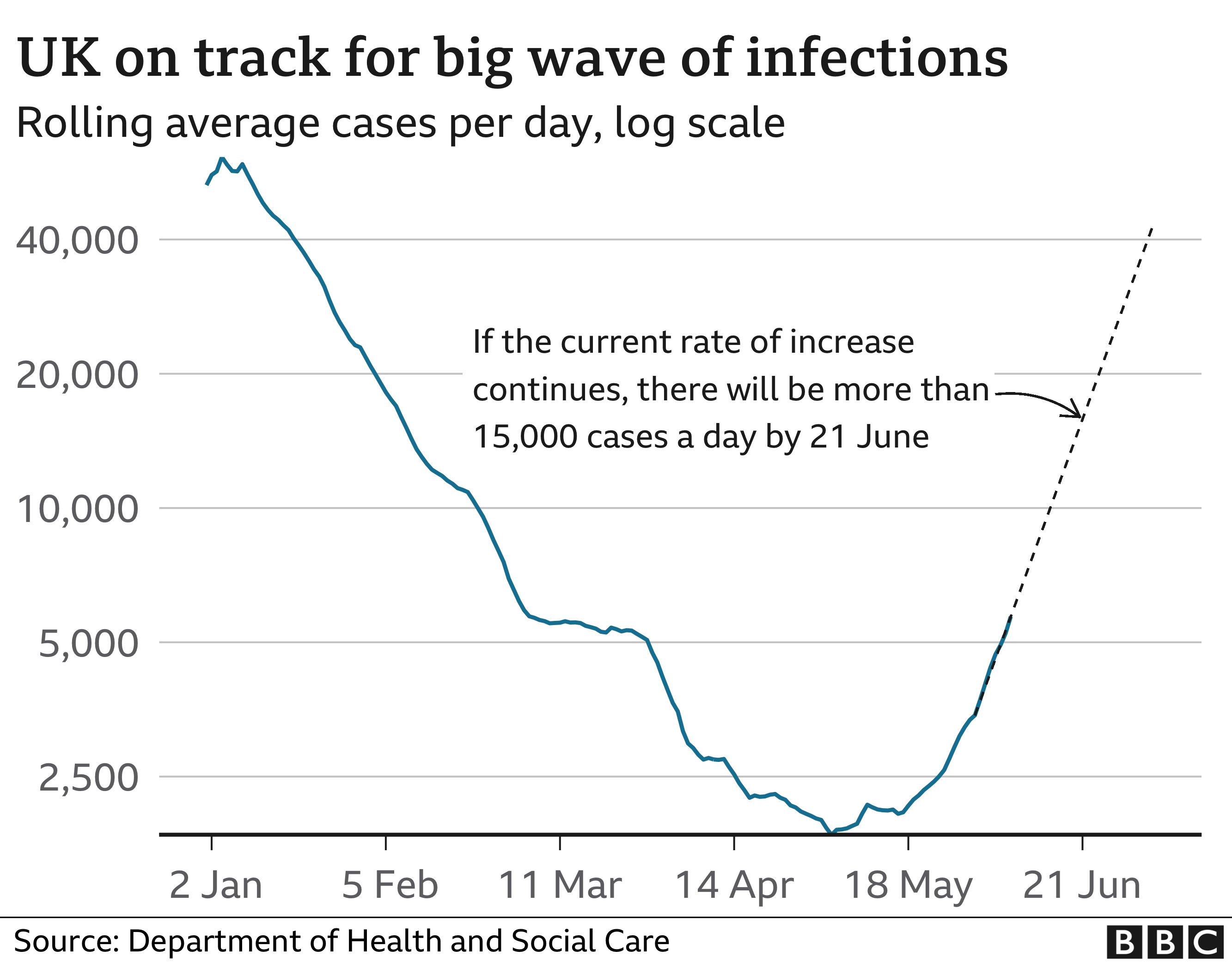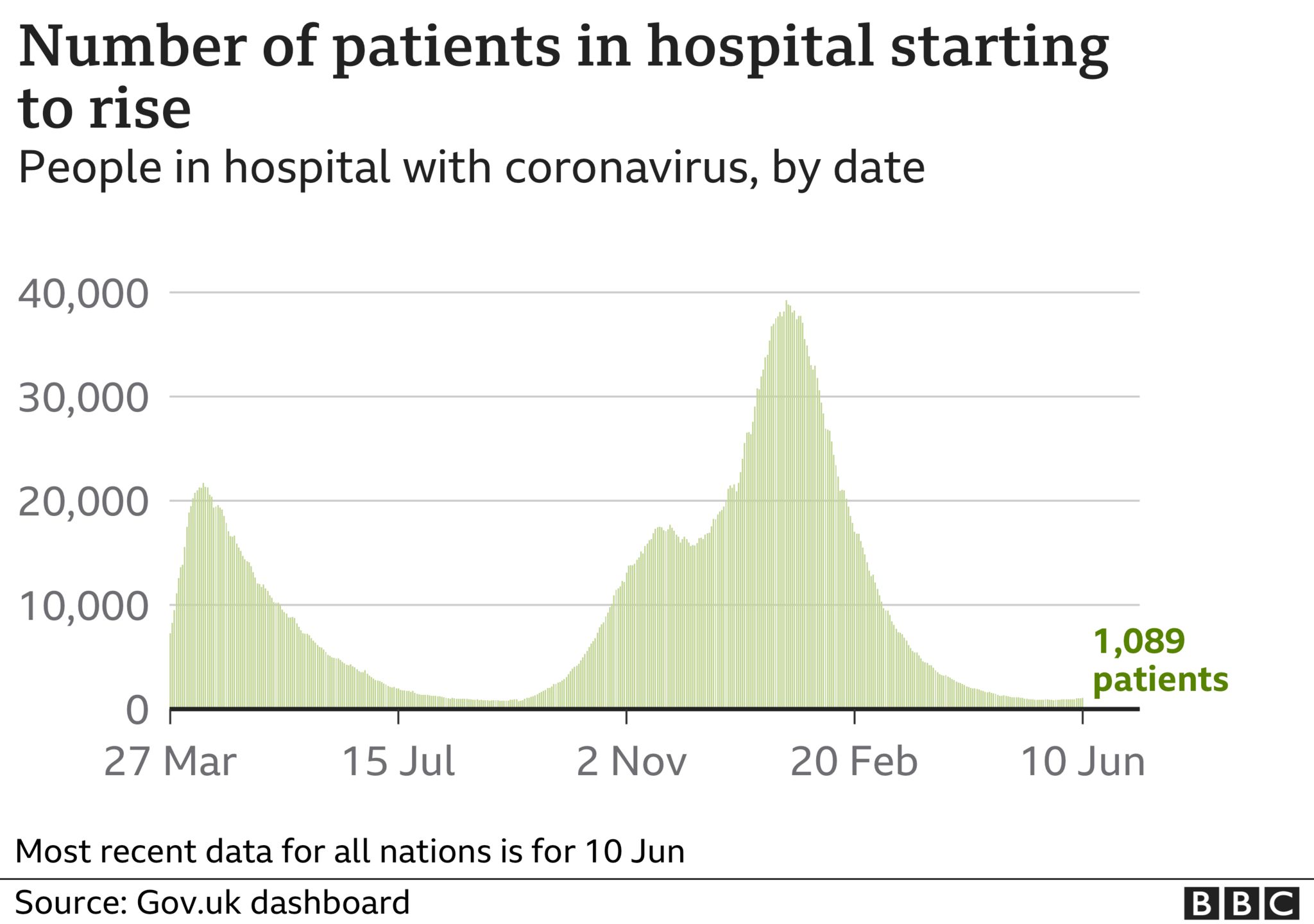BBC News 14 June 2021 - by Becky Morton and Joseph Lee
Most coronavirus rules will remain in place in England for another four weeks after the planned 21 June unlocking, government sources have told the BBC.
Senior ministers have signed off on the decision to delay the lifting of all legal restrictions on social contact.
That could mean capacity limits for sports, pubs and cinemas will remain, and nightclubs would stay closed.
The extension will be put to a Commons vote this month and could trigger a sizeable Conservative backbench rebellion.
England was due to move to stage four of the government's roadmap out of lockdown on 21 June, when venues and events would be allowed to operate without capacity limits and the cap on guests at weddings would be lifted.
But many scientists have called for the reopening to be delayed to enable more people to be vaccinated and receive second doses, amid rising cases of the Delta variant.
A delay would also allow more work to be done on whether vaccines are breaking, or simply weakening, the link between infections and hospitalisations.
Health Minister Edward Argar told BBC Breakfast that he could not confirm the delay before the prime minister's announcement, but that there was a "concerning increase" in cases of the Delta variant and numbers in hospital were "beginning to creep up".
Most severe cases were among unvaccinated people or those who had only one dose, he said. He said at the current rates of vaccination, over four weeks they would be able to administer nearly 10 million second doses to increase protection.
Mr Argar said the prime minister would address issues of economic support in any announcement and said the PM was "very sensitive" to the situation of couples who have already had to postpone their weddings, in some cases multiple times.
All areas of Scotland are due to move to Level Zero Covid restrictions on 28 June - meaning bigger groups can gather in cafés, pubs and restaurants, although they will still have to observe social distancing.
Limits on indoor gatherings in Northern Ireland are scheduled to be relaxed on 21 June and the current rules in Wales will be reviewed on 25 June.
If the lifting of restrictions is pushed back, the UK Weddings Taskforce - an industry group - estimates that 50,000 weddings planned in the four weeks from 21 June could be cancelled, with the industry losing £325m for every week of delay.
Currently the number of guests allowed at weddings is limited to 30.
The Night Time Industries Association said businesses such as nightclubs had already spent millions preparing to reopen, and the association will legally challenge any delay to reopening.
"It's going to be catastrophic to us. This will possibly hurt us more than the initial lockdown back in March last year," said Will Power, owner of the Lab 11 nightclub in Birmingham.
UKHospitality, which represents pubs, bars and restaurants, said businesses faced losing £3bn in sales if the relaxation of restrictions is delayed by a month.
Former Conservative cabinet minister Damian Green told the BBC's Westminster Hour that he wanted to see the decision to delay reviewed as more data becomes available, calling for a "break clause" after two or three weeks if hospital admissions are not rising.
On Sunday, Foreign Secretary Dominic Raab told the BBC's Andrew Marr Show that ministers "don't want to yo-yo in and out of measures".
He said the decision on postponing unlocking would depend on whether the link between infections and hospital admissions had been severed.
The prime minister has previously said the government must be cautious so any easing of restrictions is irreversible.
Rising infections in the UK are being driven by the Delta variant, first identified in India, which now accounts for 90% of infections.
It is believed to be around 60% more infectious than the Alpha variant - which was first identified in Kent and was previously dominant in the UK - and twice as likely to result in infected people being hospitalised.
Prof Andrew Hayward from University College London, who is a member of the Sage group which advises the government, said easing more restrictions would "fan the flames" of rising infections.
On Sunday, the UK recorded 7,490 new cases of Covid-19 and eight deaths within 28 days of a positive test.
The seven-day average for cases in the UK is up 49% compared with the seven days before.
If it wasn't for the Delta variant, the government would in all likelihood be announcing the go-ahead for a full unlock.
But a more infectious variant against which one shot of the vaccine works less well has created a problem.
That much can be seen from how quickly infection levels are rising. The trajectory we are on means we could see January levels of infection by the end of July.
Exactly what that means for hospital admissions is less clear. It is already obvious that while the vaccines have weakened the link between cases and serious illness they have not broken it completely - admissions are rising after all.
Early data suggests less than 5% of cases are ending up in hospital - half the rate seen previously.
But that still has the potential to cause 2,000 admissions a day if we did reach January levels of infection - twice what the NHS would see for all respiratory illnesses in a bad winter.
None of that is guaranteed, of course, and so a delay, government scientists are arguing, gives them more time to work out with confidence where we are heading - and it is even possible the immunity built up by the vaccines will have started to halt the growth by then.
The government has set out four tests that must be met for the next stage of easing restrictions to go ahead:
- The vaccine deployment programme continues successfully
- Evidence shows vaccines are sufficiently effective in reducing hospitalisations and deaths in those vaccinated
- Infection rates do not risk a surge in hospitalisations which would put unsustainable pressure on the NHS
- Its assessment of the risks is not fundamentally changed by new variants of concern
More than 41 million people in the UK have had a first dose of a coronavirus vaccine, while nearly 30 million have had two doses.
Some Conservative MPs said they were concerned that vulnerable businesses will close permanently and that the prospect of ending all coronavirus restrictions is receding.
Backbencher Peter Bone said he will vote against continuing restrictions unless the prime minister is able to show evidence that there is "a very clear danger to our society".
He told BBC Radio 4's Today programme that currently he "can't see the evidence why we should be postponing our freedom".
Former minister Mark Harper, chairman of the Covid Recovery Group of backbenchers, said now a large number of people are vaccinated, the country must live with the virus and its variants.
"If our very effective vaccines cannot deliver us freedom from restrictions, then nothing ever will," he said.
Labour leader Sir Keir Starmer told LBC Radio if the lockdown decision is confirmed, it will be because of the government's "pathetic borders policy", which he said allowed the Delta variant to become established in the UK.




